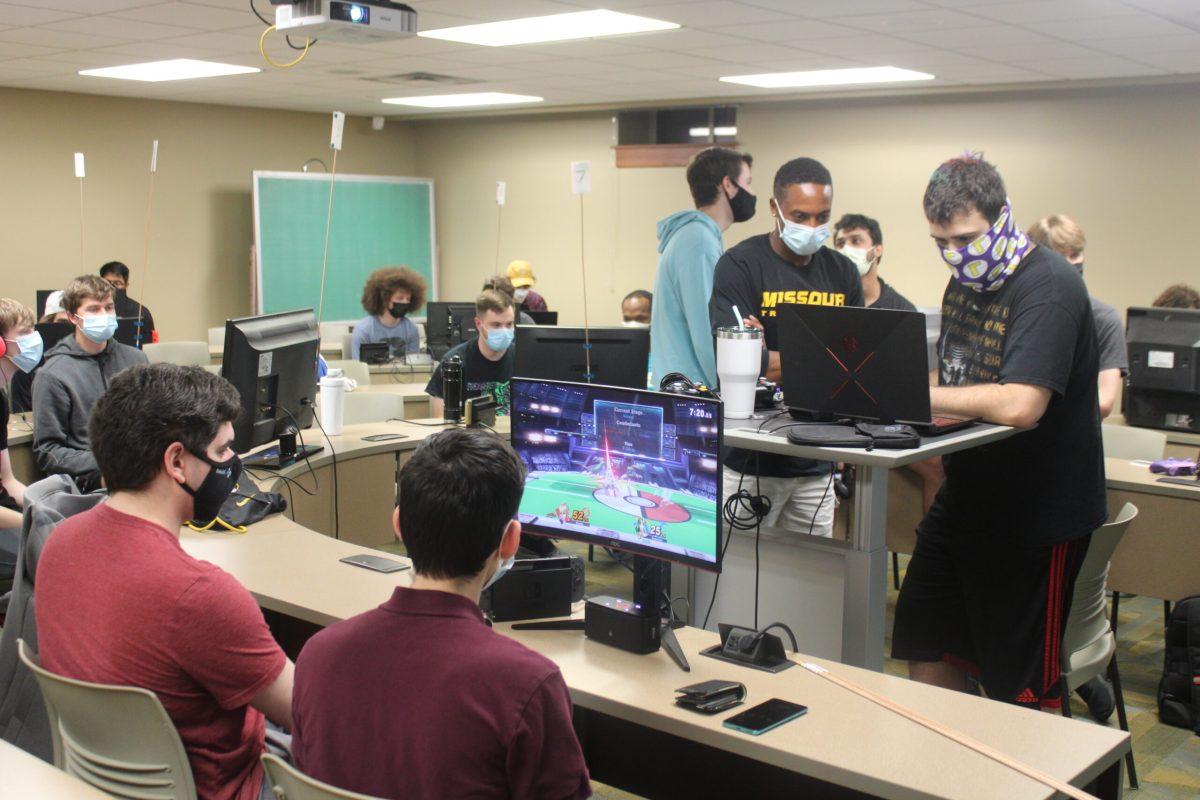The reflection of moonlight pervades a Switzler Hall classroom and dances off a dozen monitors. A Nintendo Switch and a pair of competitors sit in front of each screen. A cacophony of clicking controllers and chummy chitchat is only interrupted by clinks of Redbull cans and celebrations of victory. Scotty O’Dell, the president of the MU Smash Bros Club, announces the tournament’s next matchup on Oct. 5, but the scene repeats every week.
“It’s super hype, super fun,” O’Dell said. “We [have] got so many people coming in … and there’s a certain electricity in the air, it’s super enjoyable.”
Super Smash Bros. is a Nintendo fighting game series that dates back to 1999. Super Smash Bros. Ultimate came out in 2018, and, like its predecessors, has maintained the critical and commercial success of the franchise. One reason for the franchise’s mass appeal, evident by the 60 million copies sold, is the ability for casual and competitive players alike to have fun and compete with others.
O’Dell’s club, which hosts weekly tournaments every Tuesday at 6 p.m. in Switzler Hall, is mostly geared toward the competitive side of the fanbase.
“When there’s actual bracket tournaments, they can get a little intense,” he said. “You can tell there’s people who are trying to win and trying their best.”
Weekly bracketed tournaments, with prize pools of nearly $200, seem to leave little room for the inexperienced gamer to dip their toes in. However, O’Dell hopes the club emulates the inclusive appeal of the game itself. With separate amateur brackets and a welcoming environment, the club is designed for players of all skill levels.
“Then you have the mix of people who aren’t playing, they’re up front just laughing, talking about whatever’s going on in their lives, whatever gaming news is going on, things like that,” O’Dell said. “So there’s this nice little combination of competitiveness and a casual environment.”
O’Dell himself joined the club as a near-novice, leaving his first meeting virtually vanquished. Both his love for the game and the friendly faces he met kept him coming back. Now, as president, he often takes the top spot in the tournament, plays with many of the same friends he met in the club four years ago and works to extend his experiences to others.
“Making a welcoming scene, I feel, is my main job,” he said. “It’s a nice place where everybody belongs, you’re making lifelong friends there, and it’s really great.”
Beyond skill level, MU Smash strives for inclusivity in the age of its members. Hosting the most prominent weekly Smash tournament in the area, the club attracts local high schoolers, undergraduates, graduate students and even non-student residents of mid-Missouri.
Maaz Muhammad, a third year in the MU School of Medicine, joined the club a few years ago. After taking a brief hiatus to focus on school, his love for the game and the connections he’s made in the club brought him back as soon as his schedule allowed.
“The environment is great,” Muhammad said. “There’s always people that will always play friendlies (recreational matches) with you, so if you get knocked out of tournament early you can still play with people. Everyone’s nice, and they’re really accepting of everybody.”
A veteran member of the club, Muhammed is happy to see new members join and share his passion for the game.
“We’re really open to all types of people coming in and playing our game because we all love the game, and so we want as many people to come in to enjoy it as possible,” he said.
O’Dell agrees, and he’s made broadening the club a priority of his presidency.
“I’ve loved growing the scene over the past few years,” he said. “When I came in, there was like 15 people, and now we’ve doubled. We also try and plan real big events per a semester.”
On Nov. 6, MU Smash hosted The Zou 2, a double elimination tournament with a prize pool of at least $400. With larger prizes, infrequent tournaments like these tend to bring in more competitors than usual. It’s first iteration, The Zou, brought in 91 people in early 2020. Leading up to it, O’Dell saw The Zou 2 as symbolic of the club’s revival.
“We’re trying to get a lot of people coming in, St. Louis, Kansas City, all of the neighboring Smash Scenes coming in,” he said. “I’m super excited, we haven’t had a big tournament since the pandemic started.”
For all of its praise, Super Smash Bros. is notorious for lackluster online play because of network delay and lag. When MU Smash held online tournaments after the university shut down, there was minimal participation and enjoyment. However, now that the club is back to hosting weekly and monthly events, the energy and excitement of every MU Smash tournament suggests that any break in the fun was short-lived.
“We’re finally back,” O’Dell said.
Edited by Abby Stetina | [email protected]








